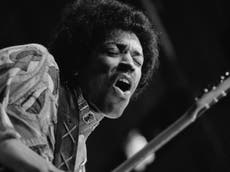Why I’d never place a bet on when gigs and music festivals will return
We know our responsibilities as members of society, even if we are stressed and scared for the future

Your support helps us to tell the story
From reproductive rights to climate change to Big Tech, The Independent is on the ground when the story is developing. Whether it's investigating the financials of Elon Musk's pro-Trump PAC or producing our latest documentary, 'The A Word', which shines a light on the American women fighting for reproductive rights, we know how important it is to parse out the facts from the messaging.
At such a critical moment in US history, we need reporters on the ground. Your donation allows us to keep sending journalists to speak to both sides of the story.
The Independent is trusted by Americans across the entire political spectrum. And unlike many other quality news outlets, we choose not to lock Americans out of our reporting and analysis with paywalls. We believe quality journalism should be available to everyone, paid for by those who can afford it.
Your support makes all the difference.Heavy metal’s best weekend of the year, Download Festival, was an early casualty of the coronavirus crisis, with the Derbyshire-based festival postponing all activity until 2021. Glastonbury – due to celebrate its 50th anniversary – Reading and Leeds, Wireless, Latitude, my favourite festival, Bloodstock; all went the same way.
“How’s this summer been?” I asked Andy Copping, promoter of Download, last week. “Empty!” he laughed, smiling to mask the disappointment of a summer wasted. Few in the UK music industry haven’t spent this summer depressed, even in despair.
Andy, like all music promoters, and festival crew, and the musicians that play at them, and of course music fans, have had a wretched summer.
I’ve been a journalist for almost twenty-years. For a decade, I worked in a variety of roles at the NME. I edited heavy metal bible, Kerrang!, for six years. I’ve seen outlet after outlet close this summer. My wife works in music too. She manages bands and producers. We know people across the industry; publicists, photographers, booking agents, sound engineers, lorry drivers, bands too. All have found themselves lost and frightened during the pandemic. The UK music industry is in crisis. The phrase, “when things get back to normal” is often thrown about. Even it that happens, most who work in music will be saddled with debt, traumatised; indelibly changed.
For a moment there, we felt hopeful. Socially distanced, outdoor gigs started happening in Newcastle. They – with each attendee directed to a small piece of distanced scaffolding they could sit on – looked about as fun as brushing your teeth with razor wire, but it was better than nothing.
A friend in a wheelchair made a point; “well, this is how I always have to watch bands when I go to a festival …” It was a sobering thought. Better were the gigs held at the HQ of cool London brewery Signature Brew. Tables kept attendees apart. A friend who attended told me she burst into tears as performer Jamie Lenman started his set, so moved to be hearing live music after six miserable months.
These events were held outside, but there was a glimmer of hope that indoor performances might soon return. Liverpool band Loathe – viewed by many as being the most exciting new rock band to swing around in eons – were scheduled to play a socially distanced show to a limited number of fans, at Camden’s Jazz Café, next month. The issue with such events is that, economically, the numbers don’t add up to make them financially viable. But it was something to look forward to at the end of a year where music fans would take anything.
Then the government reinforced who can meet up, when and where, although we’re still waiting for them to provide adequate support to UK music industry (an industry, it’s worth mentioning, that generates billions of pounds). Who knows if the aforementioned concert will go ahead.
For the largest part – with the notable exception of the conspiracy minded, Stone Roses singer Ian Brown, who tweeted his warped suspicion that lockdown was an attempt at mass subjugation this weekend - people in the music industry are aware of the serious dangers that Covid presents.
Many of us winced when Reading and Leeds promoter Melvin Benn, on the eve of announcing 2021’s headliners, told NME that “young people can resist [Covid]” – we weren’t aware that Melvin had spent lockdown studying medicine – but we know our responsibilities as members of society, even if we are stressed and scared for the future.
I have the occasional flutter on the fortunes of my football team, Doncaster Rovers, but I’d never place a bet on when festivals will return. As most who’ve spent the weekend in a field will attest, they’re places of community and communal joy. As things stand, I can’t see how they can possibly exist in an era where standing next to someone is a potential health risk. Last week, Copping told me that he was working with local authorities to put strategies together, hopeful that events next year will go ahead.
Andy is a good man, a music man, at the heart of it all, a music fan. He’s innovative and always optimistic. I hope his work isn’t wasted. I must check in with him in light of the government’s new announcement.
James McMahon is a former editor of Kerrang! magazine





Join our commenting forum
Join thought-provoking conversations, follow other Independent readers and see their replies
Comments